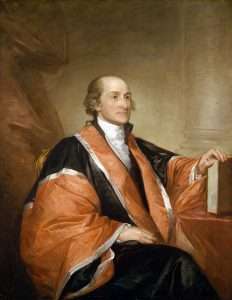The Volokh Conspiracy
Mostly law professors | Sometimes contrarian | Often libertarian | Always independent
Today in Supreme Court History: October 19, 1789
10/19/1789: Chief Justice John Jay takes oath.

Editor's Note: We invite comments and request that they be civil and on-topic. We do not moderate or assume any responsibility for comments, which are owned by the readers who post them. Comments do not represent the views of Reason.com or Reason Foundation. We reserve the right to delete any comment for any reason at any time. Comments may only be edited within 5 minutes of posting. Report abuses.
Please to post comments


Comm’r of Internal Revenue v. McCoy, 484 U.S. 3 (decided October 19, 1987): Court of Appeals can’t award equitable relief (forgiving interest on tax deficiency) that was not available to trial court
Druggan v. Anderson, 269 U.S. 36 (decided October 19, 1925): Congress can pass statute restricting alcohol any time after the Eighteenth Amendment was ratified even though not in effect yet (18A on its terms became effective one year after ratification)
United States v. Maryland Savings-Share Ins. Corp., 400 U.S. 4 (decided October 19, 1970): tax exemption applicable to nonprofits organized after a certain date did not discriminate against nonprofits organized prior
Cole v. Farris, 143 S.Ct. 366 (decided October 19, 2022): denied stay of execution of man who got angry at nine-month-old daughter for crying while he was playing Nintendo and broke her neck; schizophrenic and became increasingly unhinged during his 20 years in prison
Cole v. Farris, 143 S.Ct. 366 (decided October 19, 2022): denied stay of execution of man who got angry at nine-month-old daughter for crying while he was playing Nintendo and broke her neck; schizophrenic and became increasingly unhinged during his 20 years in prison
Why does it take decades to carry out the sentence?
Because liberals are in control of the U.S. If patriotic conservatives were, these executions would be carried out in a few months, at most.
We also wouldn't tolerate bad behavior from single women and blacks.
So, Black single women really have to toe the line.
But you would tolerate bad behavior from corrupt government officials who frame innocent people.
Gotcha.
Fuck off, slaver.
It's hilarious how you always think that someone will want you on their team in your racist hypotheticals.
You'd be the first one cut.
Cole was executed.
https://www.cnn.com/2022/10/20/us/benjamin-cole-oklahoma-execution/index.html
Breyer in his dissent in Glossip v. Gross discussed the long time on death row issue.
"Hey, Jay!"
Yea?
"It's the Day!"
Okay!
"MAY, I?"
Say!
"Where?"
This way!
"Over here?"
Nay!
[gives oath]
It's done. What is he waiting for?
"Pay."
Jay negotiated the Jay’s Treaty with Great Britain & later was elected governor of New York.
John Rutledge’s strong opposition to the Jay’s Treaty helped defeat his nomination as Chief Justice. He served a short time via a recess appointment.
Foreign service was common for early chief justices. Chief Justice Oliver Ellsworth later was an envoy to France.
His replacement, John Marshall, was one of the three ministers involved in the infamous XYZ Affair. This was before his court service.
(There was a “W” too but “XYZ” sounds better.)
I always like it when Jay’s turn (Jayday?) comes around, because of those robes.
Is he wearing those robes, or are the robes wearing him?
+1
Jay resigned from the Chief Justiceship to become governor of New York. Some interpret this as indicating the relative importance of the two offices at the time.
In any case, some justices resigned to take on other jobs. Charles Evans Hughes resigned to become a Presidential candidate, Secretary of State, and World Court judge. Then he came back to the Court as Chief Justice, though he could not have anticipated this return when he resigned the first time.
James Byrnes resigned and became Secretary of state and governor of South Carolina.
Arthur Goldberg resigned to be UN Ambassador, but he regretted if afterwards. LBJ pressured him into resigning.
Warren Burger quit the Chief Justiceship to chair the Centennial Commission on the Constitution. I’m wondering if this was a kind of semi-retirement.
Nowadays, we don’t see Supreme Court justices resigning except to semi-retire or fully retire.